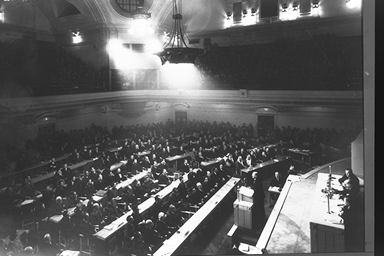

Features
On this Day in 1946: UN addresses the problems raised by atomic energy
The first session of the United Nations General Assembly was convened on January 10 1946 in London’s Westminster Central Hall and included representatives of 51 original signatory nations. They debated many things but atomic energy stands out.
The gathered assembly opened with a clear determination: “To save succeeding generations from the scourge of war which, twice in our lifetime, has brought untold sorrow to mankind, and imbued with an abiding faith in freedom and justice…”
The first resolution of the General Assembly should come as no surprise, considering it was meeting just five months after two nuclear bombs being dropped on Hiroshima (August 6) and Nagasaki (August 6), during which 150,000-246,000 people had died. Japan had unconditionally surrendered a week later, on August 15.
Resolution One of the General Assembly established the short-lived United Nations Atomic Energy Commission (UNAEC) “to deal with the problems raised by the discovery of atomic energy”, and tasked to “make specific proposals… for the elimination from national armaments of atomic weapons and of all other major weapons adaptable to mass destruction”, among other issues regarding nuclear technology.
On June 14 1946, the United States representative to the commission, Bernard Baruch, presented the Baruch Plan, wherein the US (at the time the only state possessing atomic weapons) would hand over its atomic arsenal on the condition that the UN imposed controls on atomic development that would not be subject to United Nations Security Council veto. These controls would allow only the peaceful use of atomic energy.
The plan was passed by the commission. The US even agreed to turn over all of its weapons on the condition that all other countries pledged not to produce them and agree to an adequate system of inspection. The Soviet Union disagreed and abstained on the proposal in the Security Council, as they rapidly developed their own nuclear bomb. Debate on the plan continued into 1948, but by early 1947, it was clear that agreement was unlikely.
The UN General Assembly officially disbanded UNAEC in 1952, although the commission had been inactive since July 1949.
The Soviet Union joined the nuclear club in 1949. The cold war had begun.
The UK became a nuclear club member in 1952, France in 1960 and China in 1964. Today the club includes India (1974), Pakistan (1998), North Korea (2006) and Israel (~1979). Iran looks like it will be the next nation to join this exclusive weapons of mass destruction club.
Many proponents of clean energy have accepted nuclear power as necessary evil. It is a low-carbon emissions fuel source, takes up a small area geographically and could be stepping stone to better forms of atomic energy. It has three core problems though.
Firstly, the people of Three Mile Island, Chernobyl and Fukishima may not feel it is as clean as its advocates say. Secondly, we need to store nuclear waste for a period longer than any man-made structure has ever survived. And finally, once you accept nuclear energy proliferation, you are one step from nuclear weapon proliferation and are we really prepared for a world where many countries are armed with nuclear weapons, rather than a few?
To those who consistently argue that a nuclear war could never happen, it’s always worth pointing out that we’ve already had one.
Further reading:
UN claims global emissions reductions are not yet sufficient
Peace and security are part of sustainable development, says UN secretary-general


 Environment8 months ago
Environment8 months agoAre Polymer Banknotes: an Eco-Friendly Trend or a Groundswell?

 Energy12 months ago
Energy12 months agoHow Energy Referral Programs are Saving The Planet… And Your Bank Account!

 Environment10 months ago
Environment10 months agoEco-Friendly Home Improvements: Top 7 Upgrades for 2025

 Energy11 months ago
Energy11 months agoA Closer Look at The Rapid Growth of Solar Energy in Ireland






























